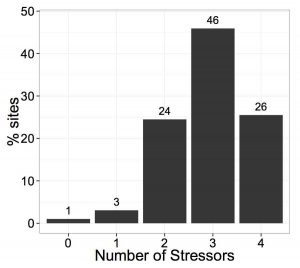In this post, Ralf Schäfer reports on their recent paper “Contribution of organic toxicants to multiple stress in river ecosystems”.

Multiple stressors are ubiquitous: The figure shows the relative frequency distribution of stressors.
Despite efforts to improve their ecological status, the majority of streams and rivers in Germany still do not reach the “good ecological status” that is required by the Water Framework Directive. The reasons for the ecological impairment of river ecosystems are manifold and include effects of hydromorphological degradation and excessive nutrient loading. Freshwater managers have largely focused on river restoration and abatement measures for nutrient loads. However, what is the contribution of organic toxicants to this situation? We don’t know, because freshwater ecologists have largely disregarded the contribution of toxicants to stress in rivers, whereas ecotoxicologists have primarily examined toxicant effects in artificial systems. In our study, we provide some first insights into the relative importance of four different stressors (hydromorphological degradation, excessive nutrient loading, organic toxicants and invasive species) for ecological risks to river ecosystems. The study was based on German monitoring data and a comprehensive analysis of different stressor data sets. The results confirm that hydromorphological degradation and nutrient loads are the major stressors in our rivers. Nevertheless, organic toxicants and invasive species posed a risk to the ecosystem in almost every second river. In addition, we found that the multiple stressor situation is rather the norm than an exception.
If you want to know which organic toxicant contributed most to the risks for German rivers, then read the paper in Freshwater Biology, which was authored by Ralf Schäfer, Bernhard Kühn, Egina Malaj , Anne König, and René Gergs.
